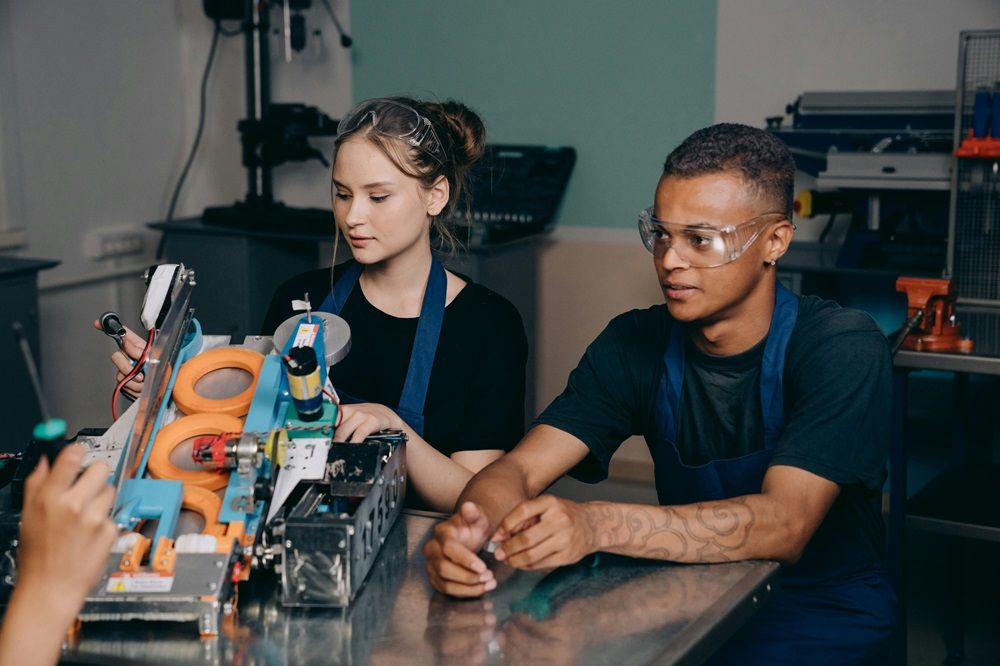Have you ever wondered why internships and work experience in engineering are so highly valued by employers? In the competitive field of engineering, gaining practical experience through internships is crucial for students and recent graduates. This hands-on exposure not only enhances technical skills but also provides invaluable insights into real-world engineering challenges. To kickstart your engineering career and find valuable internship opportunities, explore Job Mail, your go-to platform for job searches.
 Photo by Kateryna Babaieva on Pexels
Photo by Kateryna Babaieva on Pexels
Why Internships and Work Experience in Engineering are Essential
Internships and work experience are integral components of an engineering education, bridging the gap between theoretical knowledge and practical application. Here are several reasons why these experiences are vital:
1. Hands-On Learning:
Internships provide a platform for hands-on learning, allowing students to apply classroom theories to real-world problems. This practical experience is essential for understanding the intricacies of engineering projects and honing problem-solving skills.
2. Industry Exposure:
They expose students to the latest industry trends, technologies, and practices. By working alongside experienced professionals, interns gain insights into the engineering sector's current demands and innovations.
3. Skill Development:
Beyond technical skills, internships help in developing soft skills such as communication, teamwork, and time management. These skills are crucial for success in any engineering role and are often difficult to master in a classroom setting.
4. Networking Opportunities:
Internships provide valuable networking opportunities, allowing students to connect with industry professionals, potential mentors, and future employers. Building a strong professional network can open doors to job opportunities and career advancement.
6. Enhanced Employability:
Having internships and work experience on a resume significantly enhances employability. Employers often prefer candidates who have demonstrated their ability to apply their knowledge in practical settings, making them more competitive in the job market.
7. Career Clarification:
Internships allow students to explore different engineering fields and specialisations. This exposure helps in making informed career choices and identifying areas of interest and passion.
 Photo by Mikhail Nilov on Pexels
Photo by Mikhail Nilov on Pexels
Types of Internships and Work Experience Opportunities
There are various types of internships and work experiences in engineering available to students:
1. Summer Internships:
These are typically short-term internships lasting a few months during the summer break. They offer a concentrated period of learning and skill development.
2. Co-op Programs:
Cooperative education programs combine classroom learning with paid work experience. Students alternate between semesters of study and work, gaining extensive industry experience before graduation.
3. Research Internships:
These internships focus on academic research, often conducted within universities or research institutions. They are ideal for students interested in pursuing advanced degrees or careers in research and development.
4. Part-Time Internships:
Part-time internships allow students to gain work experience while continuing their studies. These internships provide flexibility and the opportunity to balance academics and practical learning.
How to Secure an Engineering Internship
Finding the right internship requires a strategic approach:
1. Start Early:
Begin your search well in advance. Many companies have early application deadlines, and starting early gives you a better chance of securing a position.
2. Utilise Online Platforms:
Use job search platforms like Job Mail to find internship listings. These platforms provide a wide range of opportunities and allow you to filter based on your preferences and qualifications.
3. Leverage University Resources:
Take advantage of your university’s career services, job fairs, and networking events. Universities often have partnerships with companies offering internships to their students.
4. Network:
Reach out to professionals in the engineering field through networking events, LinkedIn, and alumni associations. Personal connections can often lead to internship opportunities.
5. Tailor Your Resume and Cover Letter:
Customise your resume and cover letter for each application, highlighting relevant coursework, projects, and skills. Demonstrating a genuine interest in the company and its projects can set you apart from other applicants.
6. Prepare for Interviews:
Practice common interview questions and be ready to discuss your technical skills and previous experiences. Research the company and understand its projects to show your enthusiasm and preparedness.
Internships and work experience in engineering are indispensable for aspiring engineers. They provide hands-on learning, industry exposure, and invaluable networking opportunities, all of which contribute to a successful career. By actively seeking internships and leveraging resources like Job Mail, engineering students can build a strong foundation for their professional journey. Start exploring internship opportunities today on Job Mail and take the first step towards a rewarding engineering career.
Read Related Articles
- Understanding Learnerships in South Africa: A Guide for Job Seekers
- Key Skills and Qualifications for Aspiring Engineers
- How to Write an Effective Engineering CV
- Top Engineering Interview Questions and How to Answer Them
- Tips for Recent Graduates Entering the Engineering Workforce
- Common Mistakes to Avoid in Your Engineering Job Search
- Networking Tips for Engineering Job Opportunities in South Africa
- 8 Effective Strategies to Land a Job as an Entry-Level Engineer
- Internship and Entry-Level Opportunities in Electrical Engineering
- Top Engineering Specialisations and Their Job Prospects
- Understanding the Job Market for Engineers in South Africa
- How to Tailor Your Job Application for Different Engineering Fields





